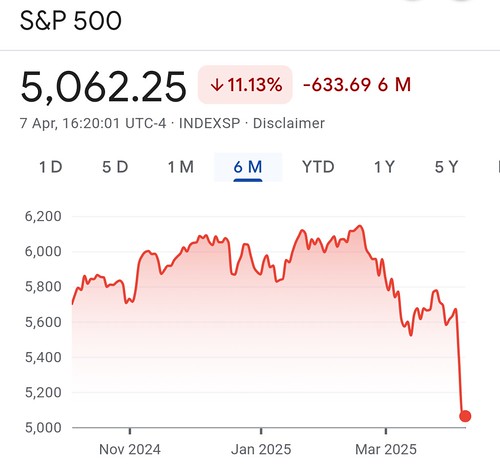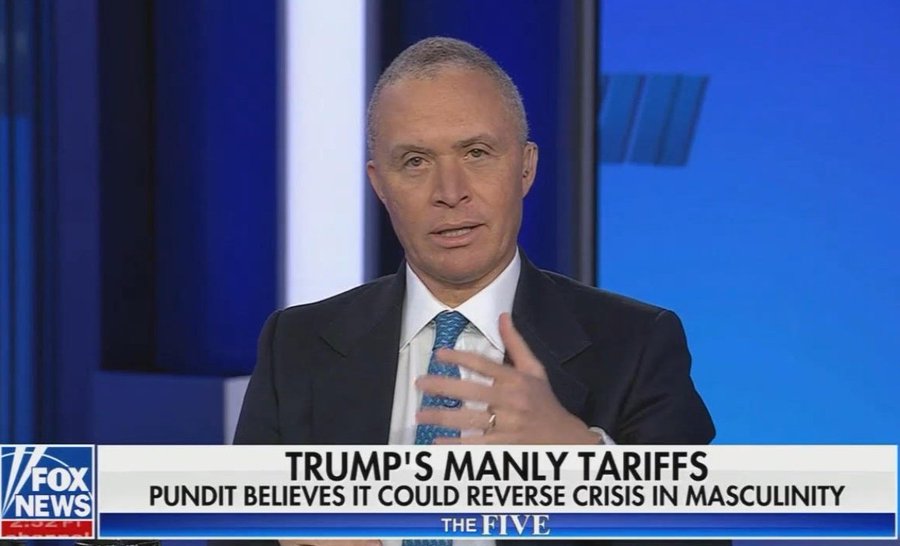
I cannot resist a post on Trump and his foolish tariffs, mostly so I can look back in a few days or a year and think
you fool, how could you possibly believe something so stupid5. But don't worry, I shall have words for other people too. First off, there are a lot of people explaining
why tariffs will raise domestic prices, why the atavistic yearning for the manufacturing jobs of the goode olde dayes
7 is doomed
1, why Trump's formula is broken in a host of different ways, and
madness in general. For all of that analysis I direct you elsewhere; my own view is just the obvious: free trade is good, govenment restrictions on trade are bad, as experience proves. Secondly, I claim no prescience on this, otherwise I would have sold off last week instead of putting my sell order in this morning. There is of course a way out of the mess: Trump reverses, or puts on hold pending negotiations, or claims great success from others dropping their barriers, or shows even some signs that he means to ameliorate his tariffs. I personally think there is a moderate-to-good chance that happens, but don't take that as advice
4. Oh, and there's another hope: that other countries don't follow the Chinese in raising barriers as retaliation
3. Cutting off your nose to spite your face is not good policy.
Noah Smith has a nice post berating leftish people. My summary (which NS liked!) is "Trump's policy is mad but alas the Dems are completely clueless in opposing it". This is what I'd like to expound on.
As a touchstone of "are you capable of thinking about economics without your party blinders" I offer you What Does Public Schooling Teach Us About Predatory Pricing? which conveniently comes my way (or this).
Preliminary: the anger that MAGA feeds on - well, that populism feeds on, Bernie Saunders is much the same - is that you're being ripped off; that life today is worse than it was for your parents; that wages aren't rising; and so on. None of it is true, but people love nothing better than getting really angry about being taken advantage of. And yet, at the same time, I assert another aspect: people are so confident of the strength of the capitalist2 system that they don't fear the risks that come from trying to make massive changes; they're confident that somehow it will all work out.
Secondary: on top of everything else, the tariffs are blatantly unconstitutional. But the constitution is not self-enforcing. Either Congress needs to explicitly take back its money-raising powers6, or someone needs to bring the case to court; there are moves afoot in both directions. As a good Popperanian, I point out once again how this points to the danger of giving government too much power; notice how none of the opposition are saying the government should not be able to do this they are only saying I don't like this thing the government is doing, my ideal government would wield just as much power, but for the good. A convenient example of this is the House Democrats, who say Trump's trade policy has been a chaotic mess, but that tariffs—if done right and paired with strong pro-worker and industrial policies—can help supercharge manufacturing. Not only is this a very bad idea, it is also desperately weak as a political strategy8.
At the moment, I think stock prices reflect what people expect of the future - i.e. the damage that will be done - and not too much of the actual damage done yet. By which I mean, they could still be reversed, if Trump just abandons all this nonsense. But fairly soon they will start to reflect real damaage - economic activity foregone, businesses closing, and so on. They have already done vast reputational damage that cannot be undone in the short term.
Every time I look at the situation something else appalling comes up, so I've probably forgotten some terrible aspect, but I think that will do for the moment.
Oh, but what does the world look like if the Dear Leader does not relent? People get poorer - and so angrier, and more prone to political extremism - and people at the margins, perhaps in distant countries, die. But - despite my headline - I think I expect my - and, dear readers, I hope your - comfortable middle class lifestyle to continue.
Update: I knew I'd forget something. One good thing the Trump admin did was starting the DEI rollback, though I'll be happy to admit that it was done crudely; but probably there was no other way. But if Trump gets completely discredited, that could stall or reverse; see this for a crude take.
Uupdate: and another: Your right to lorenorder refers. The USA is not El Salvador, but this points up the danger of a Strongman govt; or indeed of socialist / fascist govt in general.
Uuupdate: Navarro is truly a moron. What he says here is demonstrably false - E. Musk. And I’d like to apologize to bricks for calling Peter Retarrdo dumber than a sack of bricks. That was so unfair to bricks.
 Uuuupdate [2025/04/10] Well, yer Orange Man Blinked and the world breathes a sigh of relief, at least for now. Lawsuits continue, as they should. For those who want to know how I did (such as for example me): I put in my sell order (don't worry, not for my entire wealth) on Monday, it was executed on Tuesday, fortuitously more or less at the 5250 peak, and I am happy with that. Had I HODL'd I'd now be better off but still exposed. One obvious point is the potential for vast profits from insider trading (another reason for not giving one man all this power) but I'm not yet seeing much credible evidence for that.
Uuuupdate [2025/04/10] Well, yer Orange Man Blinked and the world breathes a sigh of relief, at least for now. Lawsuits continue, as they should. For those who want to know how I did (such as for example me): I put in my sell order (don't worry, not for my entire wealth) on Monday, it was executed on Tuesday, fortuitously more or less at the 5250 peak, and I am happy with that. Had I HODL'd I'd now be better off but still exposed. One obvious point is the potential for vast profits from insider trading (another reason for not giving one man all this power) but I'm not yet seeing much credible evidence for that.
Notes
1. America Underestimates the Difficulty of Bringing Manufacturing Back is a readable token in that direction. His solution won't work, though.
2. Is this the right characterisation? Perhaps just "system".
3. Just possibly this is a cunning ploy by the Chinese to raise tariffs merely as a bargaining chip that they want to throw away in return for the Mango Mussolini dropping his tariffs. If so, it doesn't look like it is going well so far. More likely China, as a Great Nation with a big dick cannot be seen to lose face.
4. As a token piece of good news, today's S+P is practically level on the day. I'm not cancelling my sell order though.
5. Ah, if only I know what exactly was the really stupid bit. But doubtless people will tell me that.
6. Some movement in this direction: Bacon, Hurd, Gottheimer, Meeks, Introduce Bill to Restore Congress’ Constitutional Role in Trade. Interesting comment: "In court, it's possibly even harder to defend a universal 10% tariff as an emergency measure".
7. Quite a bit of ye yearnninge for ye goode olde dayes is around housing affordability. This has indeed got worse but that's because idiot govts insist on restricting house building. See-also Even Acts of God Can't Fix Permitting Anymore.
8. NS: It is literally true that billionaires and CEOs, backed by neoliberal free traders, helped save the American economy from an even worse catastrophe while progressive Democrats and "anti-neoliberal" think tankers equivocated on the disaster.
Refs
* The Chinese Communist Party posting Reagan speeches about the importance of free trade…what a time to be alive.
* Rights and Wrongs of the Supreme Court's Ruling in the Alien Enemies Act Case (Scotus blog) / District Court and Fourth Circuit Order Trump Administration to Return Wrongfully Deported Immigrant (Scotus blog).
* More bad takes: Torygraph: The Bank of England must step in to stop market meltdown. But as the article says the markets are already pricing in rate cuts; and the problem here is not one bankers can fix.
* But astonishingly, a good take from the chancellor: In terms of buying British, I think everyone will make their own decisions. What we don’t want to see is a trade war, with Britain becoming inward-looking, because if every country in the world decided that they only wanted to buy things produced in their country, that is not a good way forward. In that she is batting back a foolish Lib Dem idea; it looks like the LDs are continuing the poor tradition of opposition-as-mischief-making.
* Peaks: Stanage.
* Tariff of Abominations.
* Supreme Court Rejects Trump's Claim That He Can Summarily Deport Anyone He Describes As an 'Alien Enemy'.
* Trivia by comparison, but Mackerel stocks near breaking point because of overfishing, say experts shows how the govt can't even do something trivial right; how can it be expected to get the exact value of tariffs "correct"?
* Bandwidth economics - this is similar to the Hayekian / Popperian "open society" stuff: you don't need to know about people in order to interact. Conversely, we suffer from the opposite, insisting on everyone caring about everyone else.
* Americans overwhelmingly agree that more Americans should work in manufacturing, but they definitely don’t want to work in manufacturing themselves.
* The Invisible Crash.
* Review: The Road to Freedom: Economics and the Good Society by Joseph Stiglitz.
* A Psychological Theory of the Culture War.
* There must be an in-group whom the law protects but does not bind, and an out-group whom the law binds but does not protect.
* Public Statement in Favor of Free Trade and Against Tariffs.
* The Road to Campus Serfdom.
* In defense of an online life.
* I owe the libertarians an apology says Noah Smith. It is a half-hearted apology and he has a way to go, but there is hope for him perhaps.
* The Populist Right Must Own Tariffs - ACX; better than the title suggests.
* Talking DEI with the Board of Visitors.
Pix





























 Every now and again one reads a paper saying something along the lines of "ZOMG we're all going to die of starvation". Perhaps not literally that, but it will say something like crop yields decline under global warming. And totally fail to mention that other factors - better farming, fertilisers, and so on - are increasing yields faster. So this is just a page for me to tag with the obvious rebuttals, and link to some of my old posts. My pic is from
Every now and again one reads a paper saying something along the lines of "ZOMG we're all going to die of starvation". Perhaps not literally that, but it will say something like crop yields decline under global warming. And totally fail to mention that other factors - better farming, fertilisers, and so on - are increasing yields faster. So this is just a page for me to tag with the obvious rebuttals, and link to some of my old posts. My pic is from